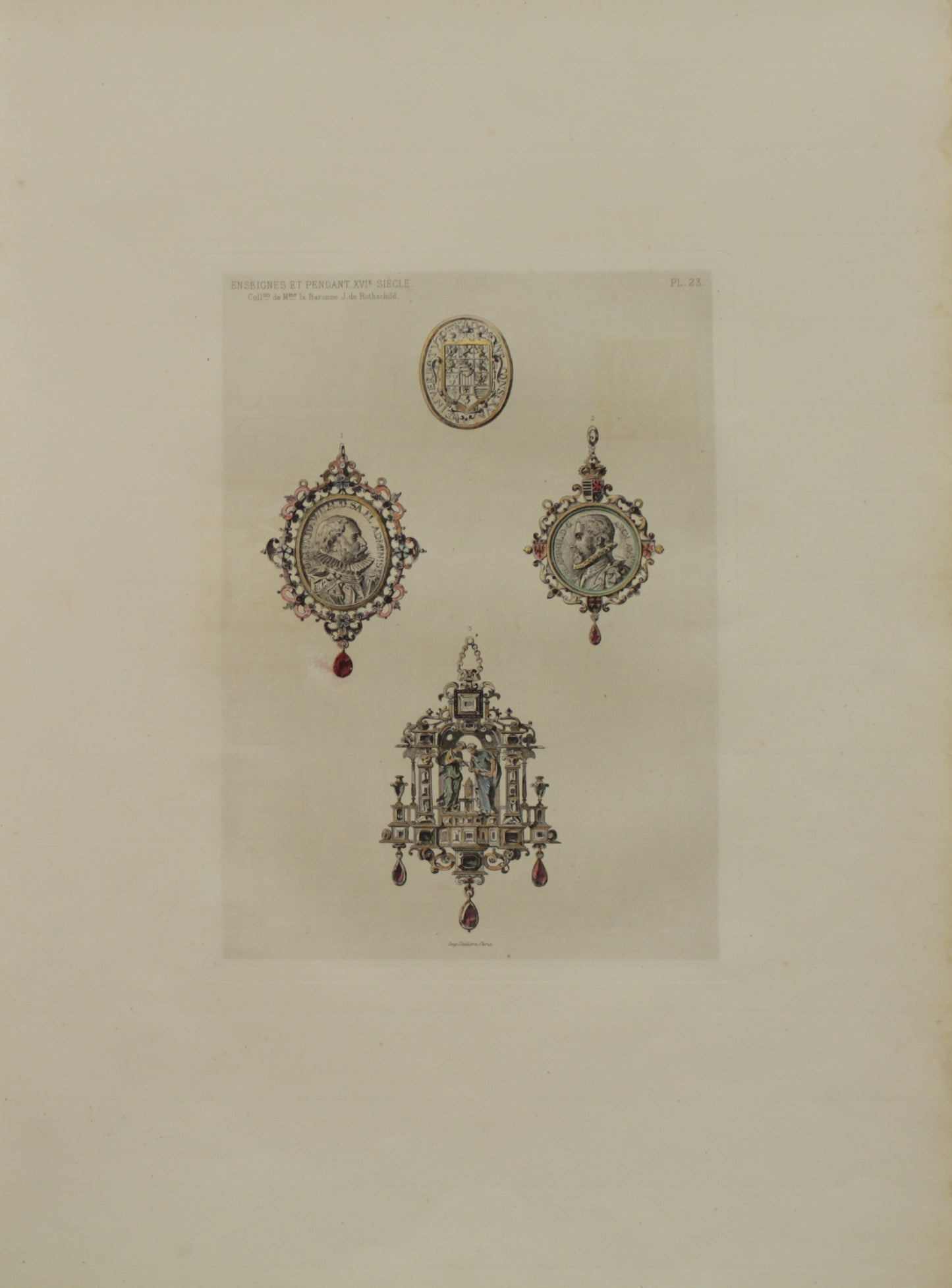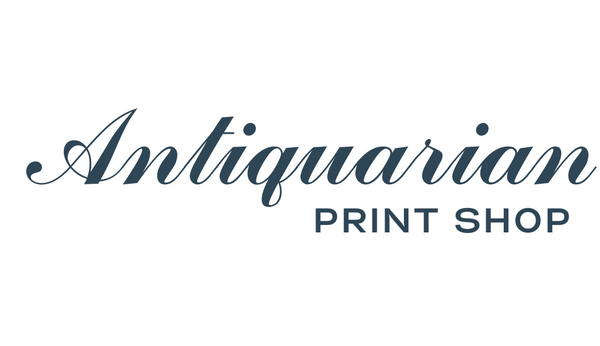1
/
of
1
Antiquarian Print Shop
Decorator, Les Collections, Celebres, D'Oeuvres D'Art, Ensignes Et Pendant XVI Siecle, From the Collection De M la Baronne J de Rothschild, Plate 23, 1864
Decorator, Les Collections, Celebres, D'Oeuvres D'Art, Ensignes Et Pendant XVI Siecle, From the Collection De M la Baronne J de Rothschild, Plate 23, 1864
Regular price
$150.00 AUD
Regular price
Sale price
$150.00 AUD
Unit price
/
per
Taxes included.
Shipping calculated at checkout.
Couldn't load pickup availability
Date: 1864
Engraver: Delatre
Published by Goupil and Co, Editors, in Paris
Paper Size: 445 x 305mm
Print Size: 215 x 170mm
Condition: Good
Technique: Copperplate Engraving
Price: $150
Description:
No. 1.
EDAILLE of Frédéric Guillaume, Duke of Saxony. The bust of the figure is surrounded by the following inscription D. G. FRID. WILL. D.SA. EL. ADMINIST. On the reverse are the coat of arms. German principalities whose coat of arms Frederick William had the right to ennoble. They are accompanied by the motto: DOMINE, CONSERVA ME IN VERBO TVO, with the date anno salut. A border of enamelled & cut-out gold forms the entourage of the medallion. The first circle is green enamel, the second is gold with four alternately white & blue flowers. These flowers are separated by dots of red enamel. The four openwork ornaments that decorate the border are in red-enamelled gold. A ruby hangs on the jewel.
EDAILLE of Frédéric Guillaume, Duke of Saxony. The bust of the figure is surrounded by the following inscription D. G. FRID. WILL. D.SA. EL. ADMINIST. On the reverse are the coat of arms. German principalities whose coat of arms Frederick William had the right to ennoble. They are accompanied by the motto: DOMINE, CONSERVA ME IN VERBO TVO, with the date anno salut. A border of enamelled & cut-out gold forms the entourage of the medallion. The first circle is green enamel, the second is gold with four alternately white & blue flowers. These flowers are separated by dots of red enamel. The four openwork ornaments that decorate the border are in red-enamelled gold. A ruby hangs on the jewel.
No. 2.
Gold medal of Maximilian, Archduke of Austria. Around the bust, seen from the profile, we read the inscription: MAXIMIL. D.G. ARCH. AVS. & the date 1586. The reverse represents a camp: lined up near a barrier, soldiers are preparing to fight: the word MILITEMVS forms the motto. The medallion is surrounded by a border of gold & enamel. At the top, an escutcheon surmounted by a crown enamelled in red and white. The crest on the right is Or with a lion Gules, that on the left is Argent with an eagle Gules; the lower one is azure with five alerions or a ruby, of a very clear tone,
is suspended below this last escutcheon.
No. 3.
PENDANT in enamelled gold enriched with diamonds & rubies. Under a portico whose pilasters are made of table diamonds set in gold, two figures in the round seem to be busy solving a problem. Dressed in a long tunic, and holding a compass in her hand, a young woman, probably Architecture, leans towards a man who is carrying a set square. These figurines are in chased gold: the complexions are enamelled, as well as part of the clothes. The columns that support the arcade are decorated with triangular capitals, in diamond: large rubies form the pedestals. On either side, apart from the pilasters, are pedestals bearing ruby vases with a gold surround. A pediment, the centre of which is adorned with a diamond, surmounts the arcade: the small monument is finished by a base with three rubies in pendants. The reverse of the jewel represents an architectural decoration made up of lineaments enamelled in red, white and greyish blue. Italian art has left us with few jewels that can be compared to the one we have just described. It was part of the Debruge-Duménil collection, sold in Paris in 1849 (no. 992). It is attributed to Benvenuto Cellini.
is suspended below this last escutcheon.
No. 3.
PENDANT in enamelled gold enriched with diamonds & rubies. Under a portico whose pilasters are made of table diamonds set in gold, two figures in the round seem to be busy solving a problem. Dressed in a long tunic, and holding a compass in her hand, a young woman, probably Architecture, leans towards a man who is carrying a set square. These figurines are in chased gold: the complexions are enamelled, as well as part of the clothes. The columns that support the arcade are decorated with triangular capitals, in diamond: large rubies form the pedestals. On either side, apart from the pilasters, are pedestals bearing ruby vases with a gold surround. A pediment, the centre of which is adorned with a diamond, surmounts the arcade: the small monument is finished by a base with three rubies in pendants. The reverse of the jewel represents an architectural decoration made up of lineaments enamelled in red, white and greyish blue. Italian art has left us with few jewels that can be compared to the one we have just described. It was part of the Debruge-Duménil collection, sold in Paris in 1849 (no. 992). It is attributed to Benvenuto Cellini.
Share


